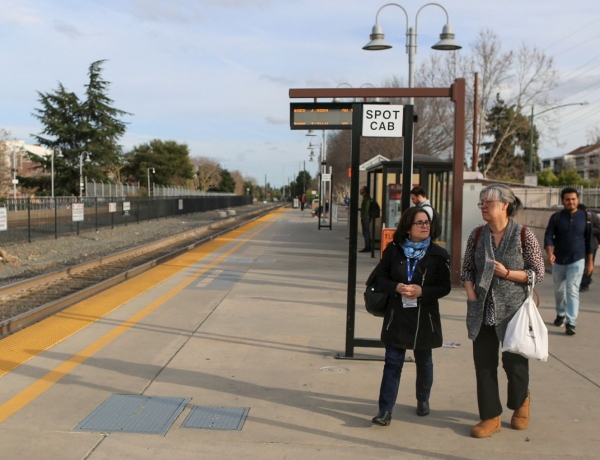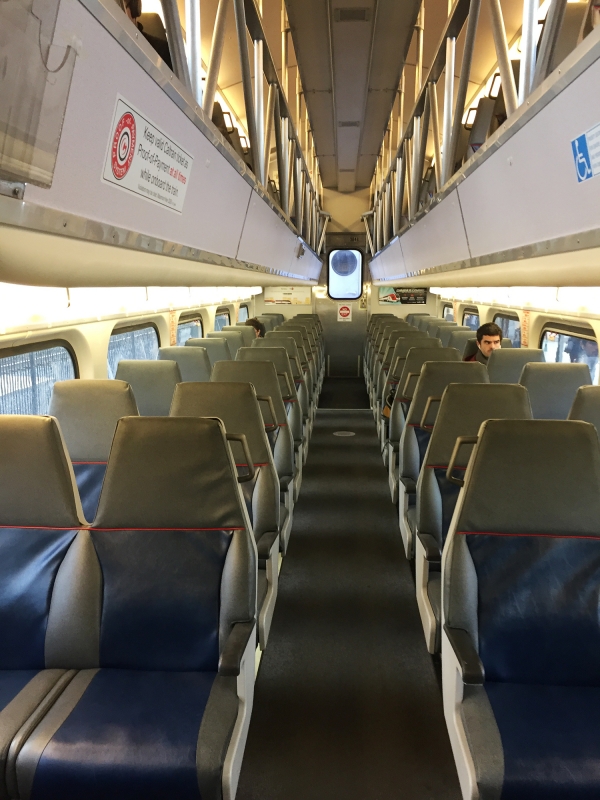Despite plummeting ridership and growing anxieties about the coronavirus, transportation agencies are planning to keep trains and buses running on their regular schedules — at least for now.
As the number of coronavirus cases has climbed in Santa Clara County over the past week, transit agencies have upped their outreach efforts with tip sheets and brochures advising riders to cover their coughs, avoid touching their faces and to stay home if they're feeling sick.
Many riders appear to have gotten the message. On Caltrain, ridership appears to have dropped off over the past week, with morning trains that are typically standing-room-only now featuring a wealth of empty seats. With many tech workers now working from home, a Tuesday morning train was three-quarters empty as it approached the Palo Alto station. One conductor compared the ridership levels to those during the Great Recession in 2008-2009.
Caltrain generally tracks ridership on a monthly basis, with numbers for March typically not available until late April, agency spokesman Alex Eisenhart said. Given the circumstances, Caltrain is planning to release some preliminary numbers next week. That said, train conductors are reporting seeing fewer riders during peak commuting hours. This, he said, could either mean that fewer people are riding or that more people are shifting to off-peak trains, in accordance with recommendations from public health leaders to avoid crowded spaces.
"It's very likely many people are staying at home and working from home," Eisenhart said.
But while transit agencies are providing advice, they are not preparing to modify their schedules just yet. Neither Caltrain nor the Santa Clara Valley Transportation Authority have made any decision to change service levels as of Tuesday evening, though Eisenhart said that Caltrain may have to reconsider the extra service it provides to large events at San Jose's SAP Center and Chase Center and Oracle Park in San Francisco.
He noted Santa Clara County's order on Monday to cancel large gatherings in the county. If events get canceled, so would the Caltrain services associated with those events, he said.
Like other transportation agencies, Caltrain has been taking its cues from county health officials and the Centers for Disease Control and Prevention. The San Mateo County Transit District, which administers the SamTrans bus service and Caltrain, is maintaining regular contact with local public health agencies, the Metropolitan Transportation Commission and the CDC, the district's CEO Jim Hartnett said in a video explaining the agency's response.
On its website, Caltrain pointed to the CDC's determination that immediate risk posed by COVID-19 to the public remains relatively low. The agency encouraged riders to wash their hands with soap before and after riding public transit; to avoid eating while onboard; to cover coughs and sneezes with their elbows; and to avoid touching their eyes, nose and mouth.
"While our buses and trains are cleaned and sanitized regularly, taking these simple precautions is in the best way to minimize your risk of exposure," Hartnett said in the video. "We will continue to monitor the situation as it unfolds and respond as necessary, in partnership with local public health and transportation agencies."
The Palo Alto Shuttle also plans to maintain its regular schedule, said Chief Transportation Officer Philip Kamhi. The city has a dedicated webpage offering information about preventive measures residents should take to reduce risk of respiratory illnesses, which can be found here. The city has also put together a flyer that includes a "Frequently Asked Questions" section and is being printed and distributed to passengers on shuttles, he said.
The VTA is similarly retaining its regular schedule and ramping up its educational offerings in response to COVID-19. The agency underscored on its website that surface transmission is "not a significant focus at this time." The VTA's page notes that the CDC has recommended frequent, routine cleaning of surfaces — advice that the VTA said "aligns with (its) protocols."
VTA buses and light-rail vehicles are cleaned daily, the agency announced. In addition, service workers wipe down the interior and frequently touched surfaces are disinfected using a bleach-based cleaning solution, its page states.
"Our goal is to keep our employees and riders informed on how best to stay healthy and prevent exposure to viruses," the VTA page states. "VTA employees are receiving ongoing updates and tools (like gloves and travel hand sanitizer) to reduce exposure. Additionally, hand sanitizer dispensers have been placed at all work divisions."
Mountain View Voice Editor Andrea Gemmet contributed to this report.
Read our latest updates on local coronavirus cases here.




Comments
Rengstorff Park
on Mar 11, 2020 at 4:59 am
on Mar 11, 2020 at 4:59 am
Public transit agencies operate mostly with tax dollars - not fares. The VTA will run buses and lightrail cars with no riders as long as it is given the money. It is really the VALLEY TAX AUTHORITY. Transportation is just a sideline.
Cuesta Park
on Mar 13, 2020 at 9:48 am
on Mar 13, 2020 at 9:48 am
An advantage of this turn of events - is that there is more space between the public transit riders that DO NEED PUBLIC TRANSIT. Who do you think needs this? Service workers for example. Those providing building and other maintenance.
The whole economy is going to operate inefficiently for at least half a year. Costly those PANDEMICS!
Rengstorff Park
on Mar 13, 2020 at 9:05 pm
on Mar 13, 2020 at 9:05 pm
Maybe the VTA bus drivers will sue to prevent anyone (else) from boarding!
another community
on Mar 14, 2020 at 8:13 am
on Mar 14, 2020 at 8:13 am
In the absence of national leadership, States, cities, and local agencies have to fight this battle on their own.
Trump fired the admiral who was in charge of our national pandemic team three years ago and has never replaced anybody in that position.
Trump and Pence have been utter failures in timely action on this epidemic.
Leaders, not liars, are needed.